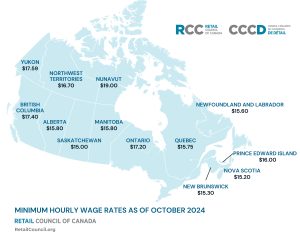Amazon is hiring 9,000 full-time, part-time and seasonal roles employees across its Canadian operations network. The company is also opening five new delivery stations in British Columbia, Alberta, and Ontario, ramping up its last-mile network to expedite order delivery.
The hiring increase follows a recent pay increase by the company to the tune of more than $100 million for fulfilment and logistics employees in Canada. Later this year, Amazon will also open two “exchange point” package depots in Sarnia and Cornwall, Ont., to be operated by local third-party partners.
Sarah McGoldrick
W. W. Grainger broke ground this week on its 1.2 million-square-foot DC in the Houston metropolitan area. The Hockley, Texas, facility is slated to open in 2026, employing a team of about 400 workers. During the ceremony, Grainger presented a US$20,000 donation to the local elementary school.
“Our goal is to ship next-day, complete orders,” Anand Lal, Grainger’s group VP, supply chain, said in a release. “To do this, we need to have a broad range of products stocked close to our customers. Greater Houston is an ideal location given its geographical proximity to current and potential Grainger customers.”
A port strike launched on the East Coast and Gulf Coast on October 1 could cost the U.S. economy more than US$3.7 billion, the equivalent of US$540 million per day, according to a new report from The Conference Board. The strike affects 36 ports which handle 57 percent of U.S. container volume, with the electronics and automobiles sectors expected to be hit hardest.
“A port strike would paralyze US trade and raise prices at a time when consumers and businesses are starting to feel relief from inflation,” said Erin McLaughlin, senior economist at The Conference Board. “There’s no easy Plan B. While shippers have already begun diverting some cargo to the West Coast, capacity for such alternative options are limited.”
Sarah McGoldrick
Small and medium-sized enterprises will receive a partial refund on carbon pricing in December, Finance Minister Chrystia Freeland announced this week. Her department says it will issue a total of more than $2.5 billion to some 600,000 businesses. The amounts disbursed will vary by province and company size. The Canadian Federation of Independent Business welcomed the announcement but continues to oppose the market-based carbon tax outright.
The industry is bracing for interruptions following the 72 hour port strike at the Viau and Maisonneuve terminals of the Port of Montreal, launched on Sept. 30.
“This is a shame that the two parties seem not to be able to negotiate. There is a lack of common good here,” said AQMAT president Richard Darveau. “Our industry is directly impacted because building materials and specifically hardware items come by boat from the Pacific before being transported by truck in the country. About one-third of any products you can find in a home improvement centre come from Asian plants.”
The strike began days before a massive strike at ports along the east coast of the United States, which is expected to have a greater effect on imports and product distribution across North America.
Sarah McGoldrick

Source: Retail Council of Canada
Four provinces have increased their minimum wage effective Oct. 1. The minimum wage in Ontario rose by $0.65 to $17.20 per hour, an increase experts say is tied to inflation. Saskatchewan’s minimum has risen by $1 to $15, the lowest in Canada. Meanwhile, Manitoba increased its minimum wage by $0.50 to $15.80. In Prince Edward Island, minimum wage rose by $0.60 cents to $16.
Sarah McGoldrick
Investment in U.S. construction edged down in August by 0.1 percent, according to U.S. Commerce Department data. In a Reuters poll, economists had projected an increase by the same factor. On a year-over-year basis, construction spending for the month was down 0.2 percent. Investment in private construction projects fell by 0.2 percent, including a 1.5 percent drop in the single-family sector.

Kevin Edgson (via LinkedIn)
Canfor Pulp Products has announced that Kevin Edgson will be leaving the role of president and chief executive officer on October 31, 2024. The company’s board of directors is currently selecting Edgson’s successor, chairman John Baird said in a statement. More details are expected in the coming weeks.
“Kevin has worked through a number of challenges including a reduction in fibre supply in B.C. and fluctuating market conditions while transitioning Canfor Pulp to a smaller operational footprint,” said Baird. “We are grateful for his leadership and appreciate his efforts to transform the company during his tenure.”
 The latest instalment of our podcast series What’s In Store goes live this week! In this episode, we talk to land economist Peter Norman of Altus Group, who will speak at our upcoming Hardlines Conference in the Charlevoix region of Quebec. He talks about the state of the Canadian economy, why we’re not in a recession, how the situation compares with the United States, and what to expect from the housing market in the coming year. Sign up now to get updates about the latest free podcasts in your inbox!
The latest instalment of our podcast series What’s In Store goes live this week! In this episode, we talk to land economist Peter Norman of Altus Group, who will speak at our upcoming Hardlines Conference in the Charlevoix region of Quebec. He talks about the state of the Canadian economy, why we’re not in a recession, how the situation compares with the United States, and what to expect from the housing market in the coming year. Sign up now to get updates about the latest free podcasts in your inbox!
 Alimentation Couche-Tard’s bid for 7-Eleven parent Seven & i reflects a growing focus by convenience store chains on food sales, The Globe and Mail reports. Amid declining tobacco sales and rising food prices, convenience stores are looking to offer customers, especially younger ones, affordable meals and snacks to go.
Alimentation Couche-Tard’s bid for 7-Eleven parent Seven & i reflects a growing focus by convenience store chains on food sales, The Globe and Mail reports. Amid declining tobacco sales and rising food prices, convenience stores are looking to offer customers, especially younger ones, affordable meals and snacks to go.
“Every single company is focusing on it, because they recognize that that’s the future,” Anne Kothawala, president and CEO of the Convenience Industry Council of Canada, told the Globe.





